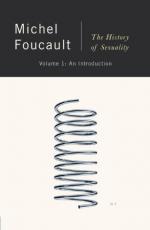
|
| Name: _________________________ | Period: ___________________ |
This test consists of 15 multiple choice questions and 5 short answer questions.
Multiple Choice Questions
1. What does Foucault say happened when there was the apparent "silencing" of sex in discourse?
(a) There was a discursive explosion of institutionalized sexual discourse.
(b) Attendance at religious institutions spiked.
(c) People became less informed and were more easily subjugated.
(d) There was a marked increase in sexual predation and violence.
2. What reason does Foucault give for modern society being perverse?
(a) It is the result of erecting too large a barrier against sexuality.
(b) It was created by the imbalance of power mechanisms and sexuality.
(c) It is from a backlash provoked by hypocrisy.
(d) It is in fact, directly, perverse.
3. What does Foucault say is possible, regarding our society, where sex is concerned?
(a) It is the best informed.
(b) It is the most tolerant of sexual perversions.
(c) It is the most long-winded and impatient of societies.
(d) It is the most repressed.
4. What does "incomplete" sexual practices refer to?
(a) Any sexual practice not condoned by law.
(b) Sexual practices that don't include one member of each gender.
(c) Any sexual practice that couldn't result in procreation.
(d) Sexual activities outside matrimony.
5. Per Foucault, what does our tone of voice tell us when we speak about sexuality?
(a) That we long for more understanding and help.
(b) That we are ashamed of our sexuality.
(c) That we derive sexual pleasure from it.
(d) That we feel we are being subversive.
6. What is scientia sexualis?
(a) The biological science of reproduction.
(b) Procedures for telling the truth about sex which are adapted from confession.
(c) The study of aberrations, perversions, and other forms of alternate sexualities.
(d) The science of mastering the act of sexual pleasure.
7. What does Foucault mean by "we other Victorians?"
(a) We are unable to willfully escape the supposed historical repression of sexuality.
(b) We are on the brink of the biggest change in sexuality since the Victorian era.
(c) We are continuing the progress of liberation from repression started by the Victorians.
(d) We are trying to restore sexuality as it was during the Victorian era.
8. What explanation does Foucault say is historically applied to the evolution of sexuality after the fact?
(a) That it was an effect of the changing values of the industrial age.
(b) That it was necessary to maintain public health.
(c) It is repressed because it is incompatible with a general and intensive work imperative.
(d) That it came with a blossoming of religious insight.
9. Which of the following is NOT one of Foucault's statements regarding the discourses around sexuality of children?
(a) They are the exclusive domain of adults.
(b) They replaced a former way of speaking about sex.
(c) They are hierarchized and interlocking.
(d) They are articulated around power relations.
10. Which of the following is NOT listed as one of the accepted ways to free oneself from the effects of sexual repression?
(a) Lifting of prohibitions.
(b) Irruption of speech.
(c) Abstinence.
(d) Transgressing laws.
11. What is the relationship between pleasure and power?
(a) They seek out, overlap, and reinforce one another.
(b) They are polarized.
(c) They turn against each other.
(d) They cancel each other out.
12. What is the most effective derivation of power in regards to sexuality?
(a) Proliferation and multiplication of sexuality.
(b) Tolerance and acceptance of disparate sexualities.
(c) Management and marginal control of sexuality.
(d) Repression and prohibition of sexuality.
13. Which of the following is NOT true, according to Foucault, about children's sex in the eighteenth century?
(a) Precocious sexuality in children was no longer considered humorous.
(b) A new regime of discourses regarding it came into existence.
(c) Discourse regarding it attempted to attain different results that it had previously.
(d) It was consigned to obscurity and universally stifled.
14. Which of the following is true about the medicalization of the sexually peculiar?
(a) There was a sensualization of power.
(b) It recognized alternate sexualities as part of the essential nature of the person.
(c) All alternate sexualities were looked at as having the same root.
(d) It was distinctly unpleasant to those receiving treatment.
15. What does Foucault say is the "speaker's benefit?"
(a) Speaking about something taboo is a transgression that gives the speaker a sense of power.
(b) Speaking is an effective way to repression.
(c) Speaking is a form of cleansing and purging.
(d) Speaking gives the illusion of experience and knowledge.
Short Answer Questions
1. What is the "repressive hypothesis?"
2. Which of the following is NOT a statement that Foucault makes?
3. Which is NOT a center that Foucault recognizes as having produced discourses on sex in the eighteenth and nineteenth centuries?
4. What does Foucault say that the science of sex achieved in the nineteenth century?
5. Which of the following is NOT true, according to Foucault, about the treatment of sex in the beginning of the eighteenth century?
|
This section contains 942 words (approx. 4 pages at 300 words per page) |

|




